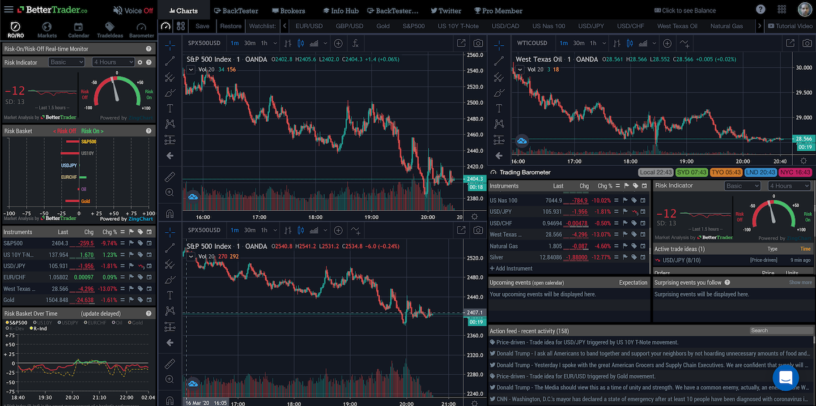Trading can be much like the sports of golf and poker. It is difficult to master, extremely competitive, and mentally draining. Like any sport, for one to be successful in the game of trading they must train their mind to handle the mental pressures and emotional peaks and valleys.
The key to profitability in trading is learning how to map your behavioral patterns to understand what aspects of trading make you tick and perform sub-optimally. Still, emotional control is not a solution, realization is, so traders must also discover how to reflect on their mistakes and grow from them.
With the proper techniques’ traders can adapt their strategy and performance to avoid trading on tilt and prevent greed and fear from getting the best of them.
Mapping Your Mentality
As traders, the first step in strengthening our mental approach to the game of trading is to map our emotional and behavioral patterns when trading. You cannot solve a problem you cannot see, so we must learn to identify the emotional, mental, and behavioral changes that occur when trading to pinpoint the root causes of our trading mistakes. Only in identifying our trading performance flaws such as confirmation bias, unrealistic expectations, having a weak process, or being too competitive can we learn to overcome them and become victorious in the game. The psychological challenges of trading are no different from any other competitive game or sport.
As a golfer needs to practice their swing and study their shot strategies, a trader must also train their minds and review their emotions and behaviors to perfect their approach. Studying our minds as traders teach us to focus our energy on the execution of a trade rather than the physical outcome.
Furthermore, by focusing on our performance and not our goals of a particular trade we can discover how to recognize when we may begin trading on tilt and avoid doing so. An amazing strategy to employ to prevent yourself from trading on tilt is recognizing your behavioral patterns prior to a downward spiral of emotions. Identification is key, but we must then disrupt this pattern to veer off the path to suboptimal trade performance.
Doing something as simple as taking a few deep breaths or standing up and stepping away from your screen for a minute can achieve such a disruption. In addition, a good habit to start is to write down the emotions you feel when you experience moments of tilt to learn to pinpoint these feelings and come to understand how to control them in your trading career.
Overcoming Your PnL
Next, for us as traders to best comprehend how to map our emotional and behavioral patterns as traders we need to understand how greed and fear affect our decisions. In trading, if we think of money as the scoreboard, greed is trying to make money where we ought not to. In other words, greed is the excessive ambition of a trade idea or strategy. Like our moments of tilt, the first step in avoiding moments of greed in your trading career is to identify past obvious mistakes that were caused by an excessive lust for success.
As traders, it is easy for us to get caught up in our PnL, but having the strength to not fall victim to gains and losses will bring you more success in the long run. Furthermore, overemphasizing your own PnL will also cause you to permit fear to guide your decisions as a trader.
A huge fear we have as traders is the fear of losing money, because for us money isn’t simply just money. Since we daily trade money on the market it manifests into our goals, livelihood, emotional stability, and even our social status, so it is easy for us as traders to obsess over our money. However, if we permit ourselves to only think about our monetary gains and losses, we will let the market control our decisions through fear.
The fear of losing money can cause trades to hesitate in their decision-making and even miss out on amazing opportunities simply because we are afraid. At the end of the day, we as traders must learn to accept defeat in some cases and remember that perfection is a moving target and it is ok to miss the mark.
The Biggest Game in Town
Trading is the sport of money, and it is filled with competition, pain, and fear. If we as traders do not know how to control ourselves while playing the game will control us, leading to emotional hardship and big monetary losses. To properly play the biggest game in town we must first learn to identify performance flaws in our trading approaches and strategies.
Once we have identified the root causes of our mistakes, we can then learn to spot these mistakes before they occur through behavioral and emotional awareness. Furthermore, getting in touch with our emotions will help us as traders to avoid falling into the traps of greed and fear resulting in less hesitation and more confidence when trading.
Summary
To best handle the mental hardships that come with trading, it is vital for us as traders to learn to study our emotional and behavioral patterns to understand the root causes of the mistakes we make. If we work to identify why we messed up rather than getting caught up in the outcome of our blunder we can learn how to spot a mistake prior to it occurring.
Preemptively pinpointing a moment of tilt will lead to huge successes in trading and life in general. In addition, we will avoid letting greed and fear get the best of us and help us as traders stick to our gameplans and gain more confidence in our decision-making.

















